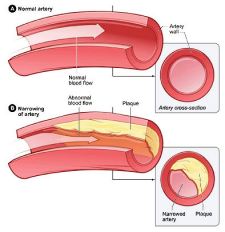Elizabeth A. Triana, M.D., FAAFP
What is Cholesterol and Where Does it Come From?
Cholesterol is a type of fatty particle found in the animal food products we eat. Most of the circulating cholesterol is manufactured by our own bodies in our liver. Dietary cholesterol is not found in plant products.
What are the Bad and Good Cholesterol?
Bad Cholesterol is the small particle LDL (low density lipoprotein). The particle is so small it can slip between cells in the wall of blood vessels and set up a complex irritation cycle (inflammation) which can narrow the vessels by forming plaque which can rupture leading to heart attack, stroke and peripheral vascular occlusion.
Good Cholesterol is the large particle HDL (high density lipoprotein). It functions as a cleaner particle helping to transport the LDL cholesterol back to the liver, sort of a physiologic sanitary engineer.
At the Triana Prevention Center advanced testing identifies the size and quantity of good and bad cholesterol particles so we can create individualized treatment to maximize the good and minimize bad cholesterol, as well as monitoring other factors associated with increased risk of heart attack and stroke.
Do you know your Cholesterol Numbers?

- When you have too much cholesterol, fat (plaque) builds up in your blood vessel walls. This restricts blood flow and can cause heart attack or stroke.
- Your body makes some cholesterol and you get the rest from food.
- Cholesterol is a soft, waxy substance.
- A Lipid Panel (blood work) checks your: Triglycerides, total cholesterol, HDL (good) cholesterol, LDL (bad) cholesterol, and chol/HDLc ratio.
- Your LDL (bad) cholesterol is an important number and should be lower than the average person if you have heart disease or diabetes. For those people at high risk we like it less than 100 and even less than 70 for some people.
- Triglycerides are stored as fat to use for energy. If not eventually used for energy, it continues to build up as fat in your bloodstream. The normal Triglyceride level is less than 150mg.
- Omega-3 fatty acids help reduce triglyceride levels, decrease plaque build-up and improve arterial health. Our body does not make Omega-3 fatty acids so we need to get it from what we eat: mackerel, salmon, tuna or dietary sources: fish oil (important that it contains EPA and DHA)
For an initial appointment call 941-625-1990.
We accommodate same day appointments & accept many different health insurance plans. Contact us today & get on the road to good health. Your life depends on it!
Family Practice
Dr. Triana practices family medicine at her Heart Attack, Stroke and Diabetes Prevention Center located at 3155 Harbor Blvd. Ste 100, Port Charlotte, FL 33952, 941-625-1990.
LIVE RADIO SHOW!
-
Dr. Triana also has a very informative live radio show that broadcasts on channel WCCF 1580 AM every Friday morning at 11:05-12:00. You can web-stream the broadcast live from www.wccfam.com or listen to previously recorded Radio Shows.